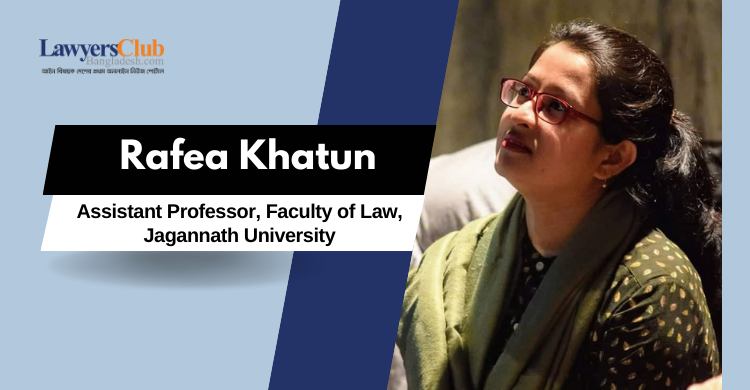A New Pyramid towards Elderly Wellbeing Regulation in Bangladesh

Rafea Khatun: The world is ageing with its population also. The concern is, this ageing population is increasing rapidly compared to its other age groups in the society. Some scholars coined this demographic transition as ageing revolution and ageing wave. According to UN demographic predictions, the proportion of the global population over 65 has more than quadrupled, rising from 5.5% in 1974 to 10.3% in 2024. This percentage is expected to increase further, reaching 20.7% between 2024 and 2074 (UNFPA, Ageing).
Although developed countries have the largest percentages of elderly individuals, developing countries are witnessing a growth rate of their elderly population that is five times that of many Western industrialized nations, with Asian developing countries showing the fastest rate of population aging among them (Mala Kapur Sankar Das, 2015 and Russel Kabir et. al. 2016). Among these Asian countries, South Asian developing countries demonstrate a strong evidence to join as an active member in the world ageing club. However, India and Sri Lanka had already been fighting with various ageing issues since long.
Bangladesh as a new addition of this ageing challenged country is facing multi-faceted problems- socio-economic, cultural, legal and political mainly (Shabnin Rahman et. Al. 2018). Though, considering all these socio-economic and legal consequences of rapid demographic change, the ageing issues have gained a significant place in political agenda of developing countries, Bangladesh is still lagging behind in this perspective.
As a recent initiative, the political parties are opting for active ageing agenda, promising for increasing social safety networks and securing various socio-economic services for the elderly people to gain political popularity among the general public. At present Bangladesh having 17.6% (in case of India 23.0% and Pakistan 13.7%) of the older people of total 18 crore population revealing an ensuing threat for near future (Ghazy Mujahid et. al. 2009).
However, regulating elderly wellbeing in Bangladesh has been cared through four approaches. Among these approaches- Informal familial and community approaches hold the significant part, secondly, state oriented legal and institutional approaches, thirdly, voluntary charitable approaches and private approaches. The informal familial approaches are declining for multi-reasons including socio-economic transitions, changes in family pattern, rapid urbanization and industrializations and fading away social values among the new generations which also exert pressure on other sectors of formal caregiving sources in Bangladesh such as private nursing homes and voluntary charitable old age homes.
On the other hand, these voluntary charitable old homes are mostly financially and administratively porn to vulnerable which hinder their self-sufficiency and sustainability in serving the rapidly increased elderly population in this country.
All these existing shortfalls oblige the elderly wellbeing to accelerate the fourth approaches- private approaches which include various private organizations such private nursing homes, private old care homes, private hospitals. However, this fourth approaches in Bangladesh are mainly profit monger and mostly beyond the capacity of common older population (Nahid Ferdousi, 2020).
On the other-hand, public legal regulatory approach is mostly focusing on some substantive laws such as The Maintenance of Parents Care Act, 2013 and some policy initiatives such as The Policy for the Older People, 2013, The national Health Policy, 2011, etc. Besides these, there are some social safety networks in operation, such as Old Age Allowance, Vulnerable Group Feeding Card etc. which arranged some monetary and some other essentials stuffs support from the government fund though which are so meagre in comparison to the actual need. Most significantly, more or less all the legal approaches are focusing on objective wellbeing of the elderly solely and their subjective wellbeing perspectives are being neglected which is half of a complete wellbeing of older people.
The above complexities in various existing regulatory approaches for elderly wellbeing created some unavoidable problems in ensuring self-sufficient and sustainable wellbeing for the older people in Bangladesh. Consequently, older people are being abused both in informal and formal care arrangements. In addition, government and family both sectors are being overburdened to ensure their essentials properly. Unlike developed countries, our resources scarcity denies to support them financially solely from family or from the public fund. Eventually, some scholars also opined that families are getting sandwich to club sandwich taking the burden of elderly of multi-grades.
In these scenarios, should we think for a new pyramid in elderly wellbeing in Bangladesh? Should the long-lasting taboo on formal institutional elderly wellbeing need to be break now? Can the elderly wellbeing be better catered through a for profit social business model which will be financially and administratively self-sufficient and sustainable compared to existing familial and charitable care sources? Should the legal regulatory approach need a change to ensure self-sufficient and sustainable elderly wellbeing governance in Bangladesh?
All these thoughts will provoke the multi-disciplinary research for establishing a sustainable elderly wellbeing in our country. And the positive responses from their theoretical and empirical investigations would create a revolution in the existing elderly wellbeing approaches in Bangladesh which could be a role model for other developing countries in South Asian Regions. Otherwise the scholars’ view on elderly demographic challenges for South Asian Developing countries is going to be true that ‘ageing before being rich’ and its upcoming multi-faceted challenges will encompass our other socio-economic issues.
The write is a PhD Candidate, School of Law, University of New England, Australia and Assistant Professor, Faculty of Law, Jagannath University, Bangladesh. Can be reached at rafeakhatunratna@yahoo.com

